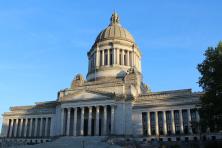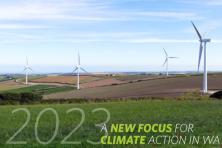This is part of a series of articles on Electrifying Transportation.
Are you one of the tens of millions of drivers or passengers planning to hit the road this holiday season? You probably are. If you’re one of those drivers, chances are you’ll also make a few stops at a gas station to fuel up. But what if instead of stopping at the gas station to pump dirty, carbon-polluting gas into your vehicle, you were able to fuel your wanderlust with clean, cheap, carbon-free electricity? Or better yet, what if our transportation system were designed in a way that did not require you to get into a car at all?

The truth is, we can get the tens of millions of drivers out of their gas-guzzling cars and into clean, electric vehicles – and probably sooner and more affordably than you might think. Consider this: electric car purchases in the U.S. grew by almost 40% last year alone. Electric vehicles are projected to be the same price as gasoline cars in the mid-2020s, without even accounting for reduced fuel costs or operating and maintenance costs to the driver. With Washington’s low electric rates, the math is pretty simple – EVs are growing in popularity not only because of the significant benefits to public health and the environment, but because they are becoming more economical as well. Given that nearly half of Washington’s emissions come from the transportation sector, the reductions in cost are hugely significant for our pursuit of a cleaner transportation system.
Since electric vehicles have no tailpipe emissions, they reduce local air pollution and create a cleaner environment for children and families that live close to streets and highways. As we electrify transportation, disproportionately impacted communities living along major roadways will be able to breathe cleaner air, improving overall health and quality of life in those communities.
But even with costs falling, new EVs may still be beyond easy reach for many families. A meaningful, accessible transition to electric transportation must not be just for the wealthy. California and Oregon have launched programs to assist low-income families in accessing cars, including electric vehicles; such programs should be expanded and replicated in states all over the country.
Electrification isn’t just for passenger vehicles anymore, either. New technology developments are creating huge opportunities to electrify buses, trucks, ferries, and other heavy equipment that travel through our neighborhoods. Transit agencies across the nation, including King County and Pierce County in Washington, are investing in electric buses because they are viable, cost-effective solutions to cleaning up our air and protecting the environment.
However, the climate benefits of shifting from fossil-fueled transportation to electric cars, trucks, buses and trains only pencil out if our electricity itself is clean—that it’s produced through carbon-free resources such as solar, wind, and hydroelectric, rather than fossil fuels such as coal, oil or fracked gas. To achieve our vision of a 100% clean energy future, we must not replace one fossil fuel with another one. As we add new power plants to our electricity grid, new capacity must be based on clean energy sources, rather than gas or other fossil fuels.
A truly sustainable transportation system goes well beyond electrifying the vehicles we use; it’s about transitioning the system to one in which we can all thrive. As we embark on the transition to 100% clean energy, we have the opportunity to rethink how we move people and goods around in this world, incorporating new ways of investing in transportation infrastructure, mass-transit funding, land-use planning, and shared mobility for everyone. Like energy efficiency, reducing the number of miles we travel each day is a critical component of solving climate change and creating a more sustainable world for everyone.
There is not a one-size-fits-all solution to achieve a truly clean transportation system. Rather, we can envision a comprehensive set of solutions that together create a clean and sustainable way of moving people and goods, in which all communities thrive. As you gear-up for your travel this holiday season, consider the impacts of your transit choices. For a moment, envision a clean energy future in which we sit in cars a little less, and the ones we do sit in are fueled by clean electricity. Together, let’s turn that vision into a reality.





